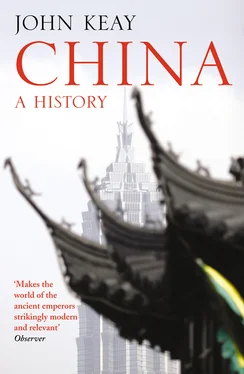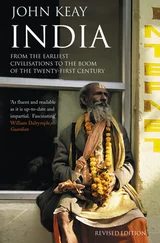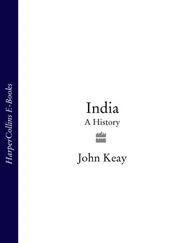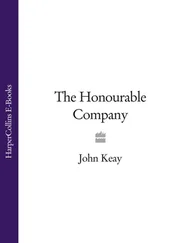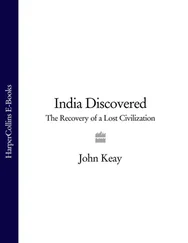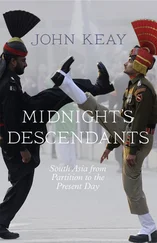In other words, depending on its historical context, zhongguo can designate a small nucleus of antagonistic states in northern China or its antithesis – a vast east-Asian agglomeration of territories under a single centralised government. The term is almost as misleading as ‘the Great Wall’. But promoters of a long and continuous tradition of Chinese civilisation rightly stress that only a shared sense of identity could have generated the concept in the first place. ‘The central states’ of the ‘Spring and Autumn’ and ‘Warring States’ periods shared a common culture; they already evinced what has been called ‘a superiority complex’ in relation to their less literate neighbours; and in their nominal allegiance to the Zhou and Heaven’s Mandate they preserved amid the harsh realities of competitive coexistence the ideal of a more harmonious political hierarchy under a single and more effective dispensation.
Through this shared world and culture of the later Zhou’s ‘central states’ there roamed not only exiled adventurers like Chonger of Jin but merchants and craftsmen, teachers, magicians, moralists, philosophers and charlatans. It was Asia’s age of itinerancy. Beyond the Himalayas the Gangetic plain also swarmed with vagrants – renunciates, metaphysicians, miracle-workers and holy men; among them were Mahavira, the founding jina of Jainism, and Siddhartha Gautama, the Buddha (‘Enlightened One’) whose teachings would enjoy a longer currency in China than in India. In both countries the multiplicity of hard-pressed states and rival courts offered avid listeners and potential patronage. Troubled times inspired a spirit of enquiry and a predisposition towards novel solutions. So too did social upheaval and the emergence of a market economy.
In northern China, social integration was already under way. In the later Zhou period the fortified cities of the Zhou’s feudatory states extended their writ beyond their immediate hinterlands to incorporate less assertive communities. These were often comprised of non-Xia peoples, whom the literate Xia knew as Di and Rong (in the west and north) or Man and Yi (in the south and east). Subdued by conquest or seduced by alliance (typically including marriages like that of Chonger’s mother), the non-Xia chiefs embraced the ‘feudal’ system of exploitation and exacted the usual tithes from whatever resources of land and labour they commanded. Under the early (Western) Zhou, agricultural exactions had taken the form of service, with the peasant labouring on a portion of his holding for his ‘feudal’ superior under a division of agrarian activity known as the ‘well-field’ system. But by the late ‘Spring and Autumn’ period a tax on individual holdings was steadily replacing it.
The tax was paid in kind, although at about the same time, in the sixth century BC, metallic coinage made its appearance. Foundries, once reserved for the production of ritual bronzes, had already begun turning out weapons and farm implements such as spades and ploughshares. The latter, increasingly of iron, plus the wider use of draught animals, made feasible the reclamation of heavy marginal lands, the terracing and irrigation of steeper loess slopes and the introduction of a winter sowing of wheat. The importance of the new tools may be inferred from the value attached to miniature bronze replicas of them, for it was these same pocket-rending playthings which served as the first coins. ‘Knife-money’, complete with blade and handle, was favoured in Qi; and more than a thousand stumpy ‘spadecoins’ have been found in a single hoard in Jin. They were evidently used as both a medium of exchange and a means of wealth accumulation. Trade was no longer restricted to tributary exactions and official gift presentations. By road and river commodities were being moved in bulk, while from far beyond the ‘central states’ came exotica like jades from Xinjiang, ivories and feathers from the south. The Zuozhuan mentions merchants and customs posts; the marketplace was an important feature of contemporary city-planning.
But perhaps the most crucial development is one that is less easy to isolate, for demographic change, like climate change, may be almost as imperceptible as it is decisive. The most compelling evidence comes from a recent statistical study of the Zuozhuan . 19This revealed that, whereas at the beginning of the ‘Spring and Autumn’ period all the most active participants mentioned in the text were the sons of rulers, during the middle of the period they were mostly ministers or members of the ministerial nobility, and by the end of the period they were overwhelmingly shi , a term that originally meant something like ‘knight’ but was now applied to all educated Xia ‘gentlemen’ without much regard to descent or profession. Thanks to natural fertility and higher agricultural yields the population had expanded and with it the whole demographic base of Xia society.
The shi , later burdened in English translation with functional descriptions such as ‘the literati’, ‘the governing class’, ‘the guardians of Chinese tradition’ and ‘the backbone of the bureaucracy’, were still seeking a role in the ‘Spring and Autumn’ period. Birth conferred on them more in the way of expectation than privilege. The younger sons of younger sons, collaterals or commoners who had acquired an education, they coveted employment and to that end cultivated professional expertise. As policy advisers, literary authorities, moral guardians, diplomatic go-betweens, bureaucratic reformers and interpreters of omens, they represent a distinct phenomenon of the age and would become a feature of later imperial government. Though once ‘knights’, only a few shi now saw active military service; fewer still engaged in agriculture or trade. Their worth lay in words, their skills in debate, and their value in a potent mix of high-mindedness and ingenuity.
Not all shi embraced the competitive job market. China too had its renunciates; their teachings in favour of personal detachment, emotional vacuity, various physical disciplines and a back-to-nature primitivism would be compounded into such works as the famously demanding Daodejing (‘The Way and Integrity Classic’, Tao-te ching ). Though compiled in the third century BC, it is attributed to one Laozi (‘Old Master’, Lao-tzu ), who, if he existed, may have lived 200 years earlier. The more rewarding Zhuangzi ( Chuang-tzu ) of perhaps the fourth century BC is another such compilation named for its supposed author but containing many interpolations. Both works as finally put together would be in part a reaction against the teachings of Confucius, a man with ‘brambles for brains’, according to the Zhuangzi . Much later, both works would become central to the canon of Daoism (Taoism) when it emerged as a not exactly coherent school of thought in the first century AD.
Other shi , while welcoming the opportunity of employment, were not very successful in obtaining it. From the little state of Lu in Shandong, a bastion of conservatism once ruled by the now sidelined descendants of the Duke of Zhou, one such son of a ‘gentleman’ set off to make his name around 500 BC. Like his father, a military man of legendary strength who was supposed to have held a portcullis aloft, this Kong Qiu seems to have had a sturdy presence and is further credited with a physical peculiarity – always an indication of future distinction – consisting of a lump on the head; perhaps it was just a very high forehead. He was not, though, interested in warfare like his father, and despite his distinctive appearance found recognition elusive. He was gone for thirteen years, travelling through many of ‘the central states’, by one of which he was briefly employed. But in a stressful age, finding a patron who met his lofty standards proved difficult, and finding one who would attend to his idealistic injunctions nigh impossible. Kong Qiu returned to Lu an admirable, if slightly ridiculous, failure.
Читать дальше
